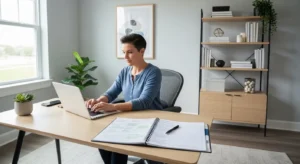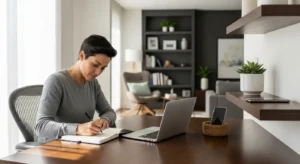
Your First Steps Toward a More Connected Meal
Reclaiming your attention and fostering deeper connections doesn’t require a radical overhaul of your life. It begins with small, consistent, and intentional choices. The device-free dinner is more than just a rule; it’s a practice in mindfulness, a commitment to presence, and a powerful symbol of what you value most. It’s a declaration that for this small part of the day, your focus belongs to the people and the nourishment right in front of you.
You don’t need to implement every strategy we’ve discussed at once. The path to healthier digital habits is a marathon, not a sprint. The goal is to find what works for you, your family, and your lifestyle. Be patient with yourself, celebrate the small victories, and remember that every moment of reclaimed presence is a win.
To get started, choose just one or two of these simple actions to try this week:
1. Designate a “Phone Home.” Find a spot outside of your dining area—a basket, a shelf, a charging station—and make it the official home for all devices during your meal.
2. Set Up a Simple Focus Mode. Take five minutes to create a “Mealtime” focus mode on your phone that blocks all notifications. Set it to turn on automatically every evening.
3. Start with One Meal. Don’t try to go device-free for every meal right away. Commit to just one meal a day—or even just a few dinners a week—to start building the habit.
4. Talk About It. Share this idea with your family or partner. Explain why it’s important to you. Creating a shared goal makes it easier and more meaningful to stick with.
By taking these small steps, you can begin to shift the balance back in your favor, transforming mealtime from a moment of distraction into an opportunity for genuine connection. You have the power to decide where your attention goes. Choose to give it to what, and who, truly matters.
Disclaimer: The information provided in this article is for educational and informational purposes only and is not intended as a substitute for professional medical or psychological advice. Always seek the advice of your physician or other qualified health provider with any questions you may have regarding a medical condition or mental health.




